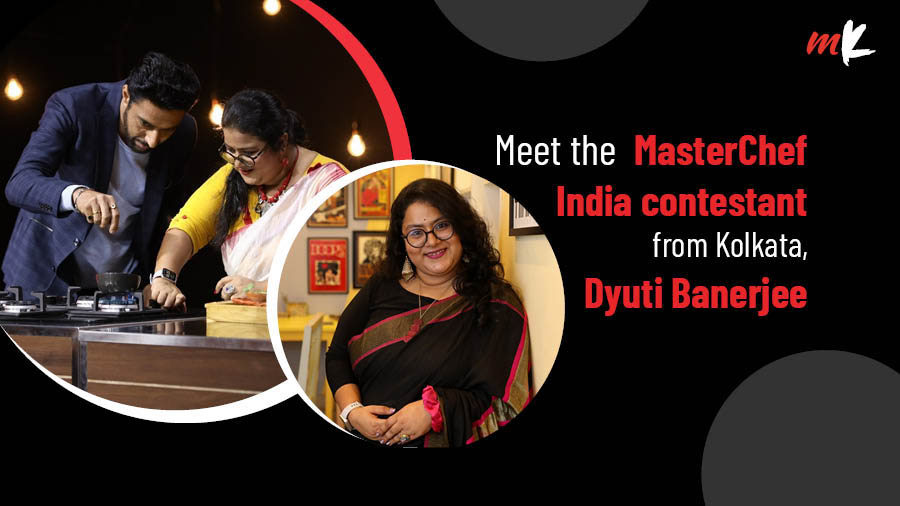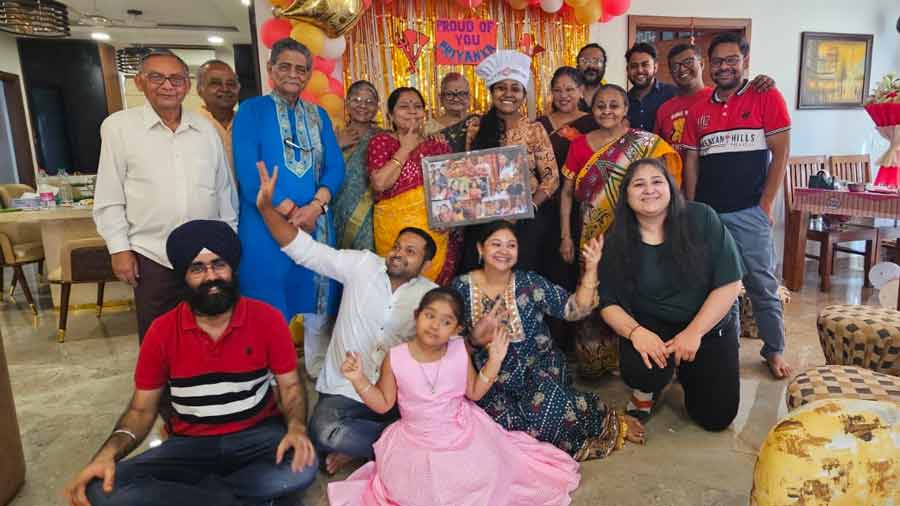My MasterChef India journey was short. The elimination was a chance to actually begin doing what I can and love most: creating flavours. The elimination also brought me closer to two brothers I made during the arduous audition days — Biswajit Moharathi, who runs Breathe By Biswajit in Bhubaneswar, and our own Kolkata boy, Subhojit Sen, of The Harmony Pot. We were the proverbial underdogs. I was eliminated from the Top 14, and they were eliminated after making the Top 36. As we bonded, we thought, why not cook together?
With that in mind, we planned our first-ever fine-dining pop-up, Nav — meaning “new”, in Bhubaneswar on May 20. The theme was straightforward: “Tradition Reimagined”. We had the venue ready, Biswajit’s beautiful industrial aesthetic-inspired restaurant, and I was ready for my first tryst in a real commercial kitchen. We were revisiting our roots, Biswajit dug deep into his Odia heritage, Subhojit wanted to bring forth the uniqueness of Bengali flavours, and for my part, I decided to dive deep into my childhood, even the flavours I was not fond of as a child, but those I grew to love, understand and connect with.
We wanted to give our patrons a curated menu, complete with appetisers, main courses and desserts, and not to forget, beverages. The theme was, of course, summer and its bounties. Biswajit served the opening drink, Tanka Torani, a summer cooler made from fermented rice. I served the first course of appetisers, Shorshe Maachh and Aamshotto Cigars with a Gondhoraj Ghol Relish (fish replaced by fresh cubed paneer for the vegetarians). It was a delight to watch guests polish it off. Second up was Subhojit’s riot of flavours, a beautiful steamed bekti with a crunchy Bori Chura Crust and Smoked Aam Pora Mayo, and Biswajit closed the first course with his wholesome and soul-filling Chhatu Rai Cutlet (veg)/ Kakharu Patra Chicken Cutlet (non-veg).
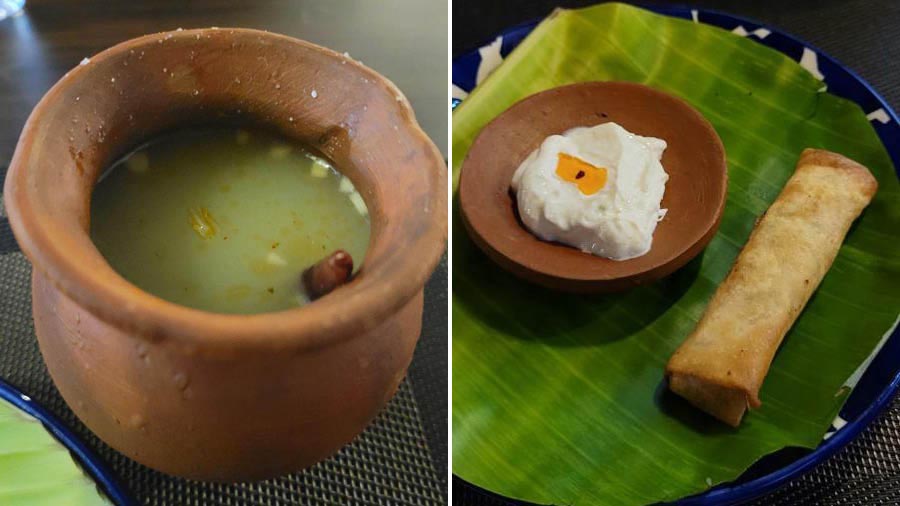
Tanka Torani, a summer cooler made from fermented rice, and Shorshe Maachh and Aamshotto Cigars with a Gondhoraj Ghol Relish
This was my first service, my plates had banana leaves on them, on which I plated my courses, and in that instant, I felt pride. Pride because my food had spread happiness, which is any chef’s dream, and pride because I stayed true to my roots without compromising on innovation. The cigars were a hit!
For the mains, we served a Panasa Patra Pitha (rice pithas steamed in jackfruit leaves) with a mutton keema curry (by Biswajit), Khud Bhaat with Panchforon Roasted Mutton Belly (by Shubhojit) and a Phyanabhaat (Bengali Congee) and Bhorta Platter by me. Phyanabhaat was an easy choice, as it was my winning dish at MasterChef. But this time, I infused the fragrant Gobindobhog with kancha aam, aam aada and gondhoraj to give the melt-in-the mouth comfort dish some zesty summer accents.
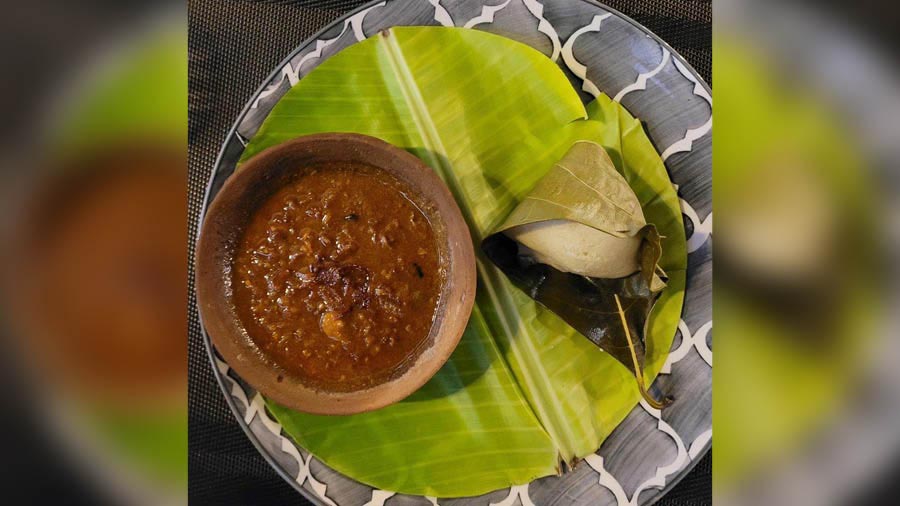
Panasa Patra Pitha (rice pithas steamed in jackfruit leaves) with a mutton keema curry
I paired it with Gondhoraj salt, Chilli Mint Oil, Dohi Lonka Bhaja, Bori Bhaja, Tomato Roshun Pora, Peyaj Posto Bata, Pui Shaak Tempura, Aam Murgi Bhorta and Gathi Kochu Chingrir Bhorta for the non-vegetarians, and Kathal-beej and Straw Mushroom Bhorta with Kalojeere and Bhaja Moshla, and Alu Potoler Beejer Bhorta for the vegetarians. In my own small way, I was hat-tipping my favourite person in the world, no longer with us — my darling grandfather — my Baboojidada, who never returned to the East Bengal of his childhood, but who carried the memories of his homeland in his love for gathi kochu with chingri and jackfruit seeds. We wanted to be sustainable, we wanted to not use any imported ingredients as much as possible, and we wanted each plate to reflect our hearts.
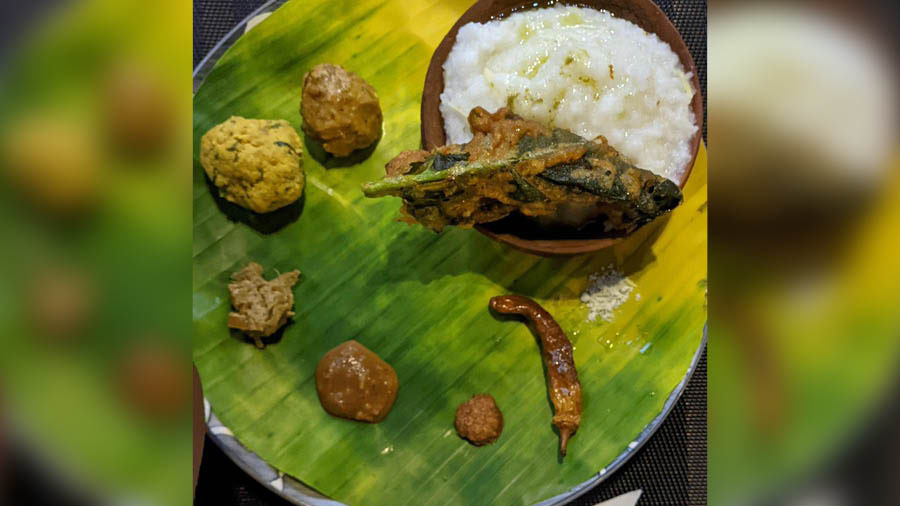
Dyuti’s Phyanabhaat and Bhorta Platter
This was an unique event — RJ Komal kept the guests entertained with food-trivia quizzes, anecdotes and the kind of happy fervour that makes a dinner a feast for the soul. Rupesh Jeevan belted beautiful Bengali and Odia songs, which reached us in the kitchen and made us hum as we plated each dish. There was joy, there was peace — the peace that comes with the knowledge that you are where you are meant to be.
By the end of the mains, there was many a twinkle to be seen in the eyes of our guests, the kind that comes with fullness of appetite and the soul. Renowned food critic and connoisseur, Alka Jena, hugged me and said, “What a thoughtful menu… I love the Pui Shaak Tempura and how you used ingredients so close to our hearts”.
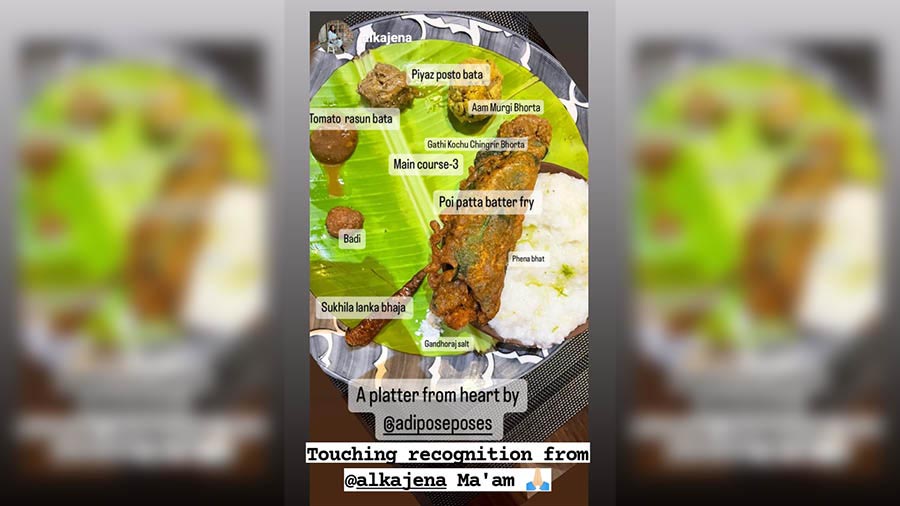
When I began my food journey in 2021, in the midst of a raging pandemic, with my cloud kitchen The Calcutta Calorie, I did not dare identify as a chef — I was a lawyer, a tad disgruntled at that, and aspired to be an academician and writer. But my middle-class Bengali conditioning did not allow me to dare to make a profession out of my passion for baking and cooking. It was a cosy dream at most, a small monetised hobby, perhaps, till I accidentally found myself in the MasterChef India Top 16. But even being on Masterchef had not convinced me that I was, indeed, a chef, as that life-charged evening and those free-flowing compliments did. Those plates that returned, polished clean, meant just one word to me — Chef! My knees shook with the giddy joy that only first experiences can bring.
I next presented in bhnars, one of Kolkata’s most iconic drinks, and the one drink that had a million memories for me, Paramount’s Daab Sherbet, the drink that was my grandfather’s legacy as I joined the place dearest to me in the world, Presidency College. This drink is the most symbolic of my coming-of-age, it is my bildungsroman in liquid form, and the joy when guests loved it was indescribable. It was the joy of homecoming, of dreams coming true at last. And it set the mood for the sweet ending to a perfect evening.
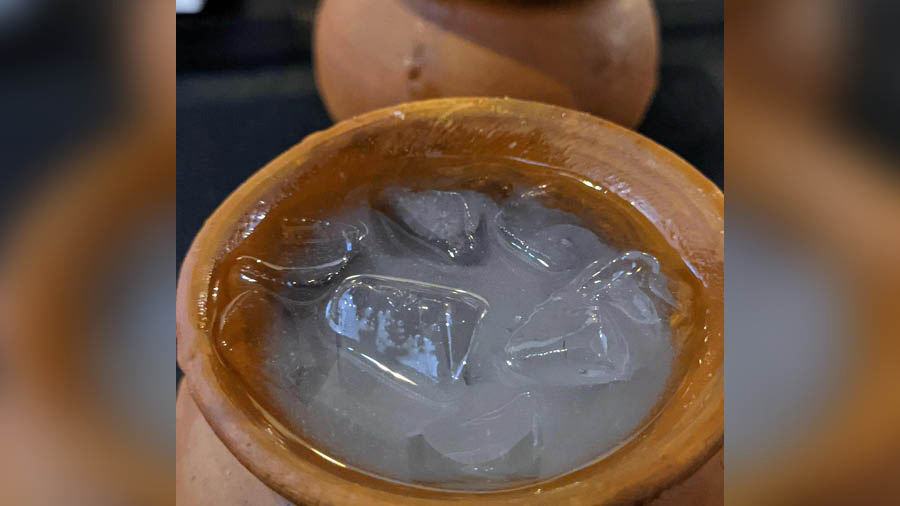
‘Paramount-style Daab Sherbet – this drink is the most symbolic of my coming-of-age, it is my bildungsroman in liquid form,’ says Dyuti
First up was Biswajit’s Sarsatia with Pumpkin Rabdi, which looked so incredibly delicious that I had to stop plating my own dessert, and steal a helping, and I wish I had the chance to sample more of that slice of heaven! Second up was Subhojit’s Whipped Makha Sondesh with Kaju Badam Chit, dreamy, with the surprise crunch element, and so elegant yet homely. Last up was mine — dessert is always my favourite course to make and to eat, and since we were revisiting our childhoods, I had to choose the patishapta.
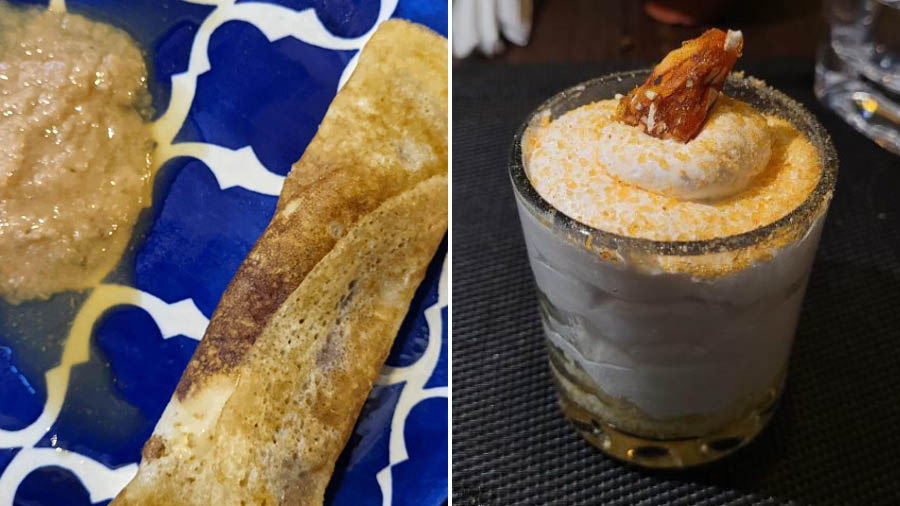
Mango Coconut Patishapta and Whipped Makha Sondesh
I made the coconut filling, just like my grandfather used to make in the warm winters of my childhood, topped it up with fresh ripe mango chunks and rolled the patishaptas the way I liked them best, a little brown and moist. With it, I made another childhood summer favourite, again reminiscent of summer holiday afternoons, when my grandfather used to peel piles of litchi for me to eat — a Lichoo Tal Patali sorbet, tempered with just a hint of mint to soothe the palate further. It was an emotional finale to the entire event.
As the evening wore into a humid summer night, and everyone lined up for selfies with the chefs, we knew we had done it. Nav 1.0 was a success, we were loved, and the unanimous question we got asked was when we would be back. Back in Calcutta, I still got messages from guests and food bloggers, asking when Nav 2.0 is going to be held. For me, for us, those texts are a treasure — our success story.
And now, we cannot wait to cook in Calcutta, for Calcutta. So, Subhojit and I brainstormed flavours and ingredients, dreaming about another pop-up and Subhojit said, “Why not?”. With that, the idea for our first collaboration pop-up in Calcutta was born.
On June 17, 2023, 5.30pm onwards, the two of us are cooking together at The Harmony Pot (near Jadavpur) for our pop-up event, Rain and Rainbows — a twin prayer through food. The menu for this has been ideated with a lot of heart and soul, and there will be colours, love in every bite, and a monsoon vibe in each course we will serve. It will be an intricate seven-course menu, starting with an amuse bouche course — Bhnarer Cha, Gondhoraj Lime Brown Butter Muri Makha and Ranga Aloo Pora Shingara. Moving on to our first plate, we will serve Purple Rain on Steamed Bekti in a Paka Aam Jhaal Sauce. Next, we will serve a Cucumber Kancha lonka Gazpacho to cool the senses and to build an appetite for our main course, which is a Neel Shada Kamini-Kaon with Kalojeere Ema Datshi and Pan-Seared Parcel Baked Lemongrass Mutton Chop.
We will take a break with our palate cleanser Lebu Batashar Sherbet with Bhaja Moshla, before moving on to chatni served in a syringe inside a Papor Bhaja Roll, and finally the dessert, Vanilla Jilipi with Kathal Narkel Kulfi.
We are again keeping the ingredients wholly local, trying to make the event as low-waste and sustainable as possible, using shaalpata, maatir malsha, shora and kolapata wherever we can, instead of using ceramic plates, to keep alive these traditional crockery of Bengal and to promote this industry dying in the face of commercialised serveware, and most importantly, to bring back a piece of chhotobela for ourselves.
We want to replicate the rainy evenings of our childhoods, we want to celebrate the liberation that the college canteen signified, specially to a Promod da-goer like me! And we want to feed people the way a Bengali jamai is fed, paat pere. It is a limited capacity event, with only pre-booked reservations, but there will be more such events in the months to come — because we are indeed growing greedy for the love in the form of plates polished clean, and this love is what keeps a chef going!

